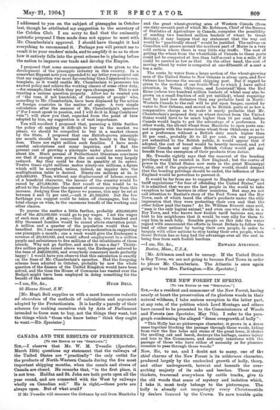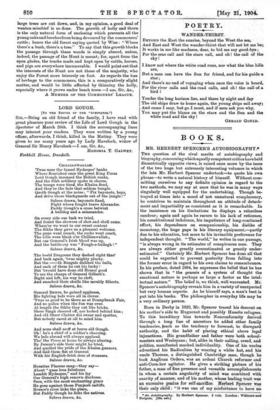[To THI EDITOZ OT TELE "SPYCTATOR."1
Si,—As a resident and commoner of the New Forest, having nearly at heart the preservation of its glorious woods in their natural wildness, I take serious exception to the latter part, at any rate, of the petition which Lord Montagu and others have caused to be presented to, the Commissioners of Woods
and Forests (see Spectator, May 7th). I refer to the para- graph condemning the alleged "dense overgrowth of holly " :
"This Holly has no picturesque character, it grows in a dense mass together blocking the passage through these woods, hiding from view the fine boles and stems of the great trees, it chokes the seedling oak and beech, destroys the herbage, causes injury and loss to the Commoners, and seriously interferes with the passage of those who have either of necessity or for pleasure occasion to pass through these woods."
Now, Sir, to me, and I doubt not to many, one of the chief charms of the New Forest is its wilderness character, produced largely by the unchecked growth of holly, thor, and other undergrowth, betwixt and beneath the over- arching majesty of its oaks and beeches. These mazy thickets, traversed everywhere by cattle tracks, give to the old woods that sense of mystery and isolation which, I take it, most truly belongs to the picturesque. The holly is already cut unsparingly every Christmastide by dealers licensed by the Crown. To save trouble quite large trees are cut down, and, in my opinion, a good deal of wanton mischief is so done. The growth of holly and thorn is the only natural form of enclosing which prevents all the young oaks and beeches from being devoured by the commoners' cattle ; hence the old forest saying quoted by Wise : "Where there's a bush, there's a tree." To say that this growth blocks the passage through these woods is simply absurd, unless, indeed, the passage of the Hunt is meant; for, apart from the open glades, the tracks made and kept open by cattle, horses, and pigs are everywhere innumerable. I would point out that the interests of the Hunt are not those of the majority, who enjoy the Forest more leisurely on foot. As regards the loss of herbage to the commoners, this is a comparatively slight matter, and would be little affected by thinning the holly, especially where it grows under beech trees —I am, Sir, Fie.,
A MEMBER OF THE COMMONERS' LEAGUE.



































 Previous page
Previous page